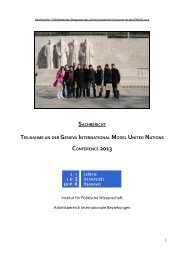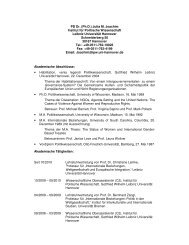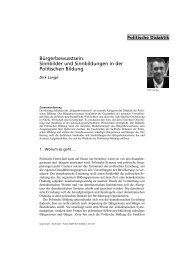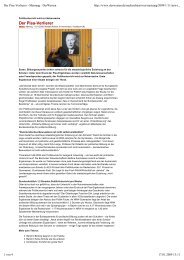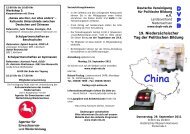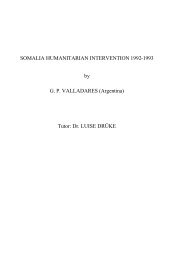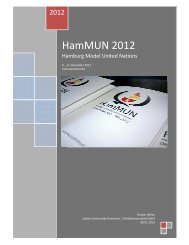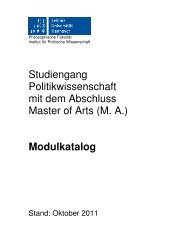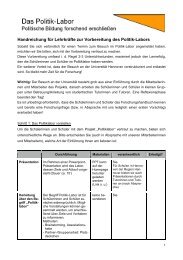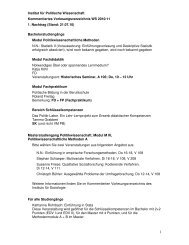Preventive Action for Refugee Producing Situations
Preventive Action for Refugee Producing Situations
Preventive Action for Refugee Producing Situations
You also want an ePaper? Increase the reach of your titles
YUMPU automatically turns print PDFs into web optimized ePapers that Google loves.
monitoring of factors related to possible refugee flows.<br />
a) Early warning <strong>for</strong> conflict management/prevention<br />
After five years of operation and with the arrival of the new<br />
Secretary-General in January 1992 the constellation <strong>for</strong> UN early<br />
warning is newly emerging. As of 1 March 1992, ORCI was dissolved<br />
and its various components integrated into the newly established<br />
Department of Political Affairs and the Department of Humanitarian<br />
Affairs. The decision of Mr. Boutros Boutros-Ghali <strong>for</strong> rearrangement<br />
might be explained in two ways: first, he was aware that ORCI had<br />
not been able to fulfill its mandate, and second, he wished to use more<br />
traditional manners of organizing research and analysis <strong>for</strong> diplomatic<br />
decision making divided into geographical areas. 356<br />
Whereas the ORCI structure represented a single channel <strong>for</strong><br />
in<strong>for</strong>mation and advice to the Secretary-General, the new system is<br />
divided into several channels. There is die news-gathering section that<br />
monitors some 15 to 20 news sources and summarizes the relevant<br />
developments <strong>for</strong> the Office of the Secretary-General. 357 This section<br />
has been separated from the analytical work of the early warning<br />
mechanism. It operates under the SG's Spokesman in the Department<br />
<strong>for</strong> Public In<strong>for</strong>mation where political core issues are likely less<br />
focused on than <strong>for</strong>merly in ORCI. This physical separation might<br />
cause some problems in the future.<br />
Some <strong>for</strong>mer ORCI staff who had been responsible to analyze<br />
incoming in<strong>for</strong>mation <strong>for</strong> early warning indications have been split<br />
now to deal with Africa, the Middle East, Asia, Europe and the<br />
Americas, and humanitarian affairs, with different lines of authorities.<br />
There are likely to be differences of interpretation of emerging<br />
conflict situations, and the need and nature of the involvement of the<br />
Secretary-General and the Security Council. The conception of the<br />
early warning system and the establishment of the computerized<br />
database is expected to continue to be used in the new set-up. It is<br />
detached, however, from both the news<br />
___________________<br />
356 Jürgen Dedring, "Early Warning at the United Nations - Revisited",<br />
Note <strong>for</strong> the ISA Convention, Atlanta, Georgia, 1-4 April 1992.<br />
357 The News Distribution of the Spokesman's Office/DPI include "Political<br />
In<strong>for</strong>mation Bulletin", see <strong>for</strong> example #3, on News Agencies on Current<br />
Political Issues of 1 April 1992.____________________________<br />
New Approaches and Policies 155<br />
service and the geographical data units. The hope is to eventually arrive at a<br />
state-of-the-art instrument <strong>for</strong> precedent based analysis and advice on<br />
emerging conflicts, both international and internal, as they affect<br />
international peace and security. 358<br />
Specifically, during the first press conference by the Secretary-General<br />
on 19 March 1992 in New York, Mr. Boutros Boutros-Ghali was asked<br />
whether the United Nations was adequately in<strong>for</strong>med about the most<br />
sophisticated intelligence to carry out its work, or whether it should improve<br />
its access to sophisticated intelligence in a cooperative ef<strong>for</strong>t involving all<br />
UN Member States. The Secretary-General replied that he believes that the<br />
United Nations must have its own intelligence. He underlined that, if the<br />
United Nations wants to maintain its independence, receiving in<strong>for</strong>mation<br />
from the different intelligence of the Member States must be avoided.<br />
Though he recognized that this will require additional financial capacity,<br />
non-existent <strong>for</strong> the time being, he emphasized that:<br />
If we want to have preventive diplomacy, we will need to have our own<br />
intelligence and a more important presence of the United Nations in the different<br />
countries and in the different regions where there will be the possibility of having<br />
military confrontations. 359<br />
This is an ambitious challenge. As officials responsible <strong>for</strong> this work in the<br />
UN pointed out, the relentless pursuit within the UN to build a viable<br />
framework <strong>for</strong> early warning is becoming ever more urgent, because the<br />
opportunities are increasing.<br />
b) Early warning in the humanitarian field:<br />
The main problem of early warning in this field and especially in the<br />
refugee area has not been a lack of in<strong>for</strong>mation, but rather the issue of how<br />
existing in<strong>for</strong>mation could be channeled into the UN decision-making<br />
process at high levels. This was also one of the findings of the UN Joint<br />
Inspection Unit (JIU) which provided a detailed study on the coordination<br />
of activities related to early warning of possible refugee flows in July 1990.<br />
Since the JIU arrived at the basis conclusion that the UN lacked a systemwide<br />
mechanism to deal with the issue of potential mass flows, its<br />
recommendations included the following measures:<br />
__________________________<br />
358 Jürgen Dedring, "Early Warning at the United Nations - Revisited", p. 3.<br />
359 SG/SM/4718, 19 March 1992, Transcript of Press Conference by the<br />
Secretary-General Boutros Boutros-Ghali, held at Headquarters today, 19<br />
March [1992].




